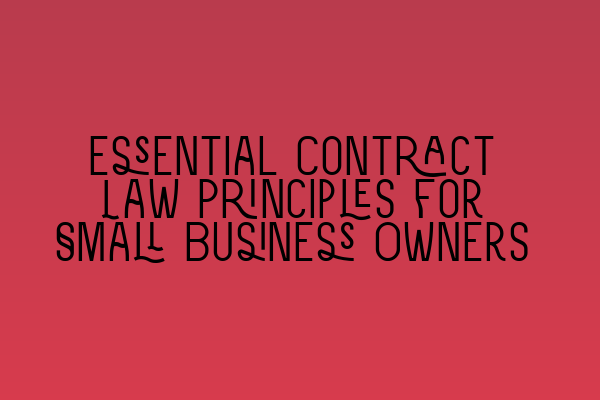Essential Contract Law Principles for Small Business Owners
As a small business owner, you may find yourself entering into contracts on a regular basis. Contracts are essential for setting out the rights and obligations of each party involved and ensuring that both parties are protected. Understanding the basic principles of contract law is crucial to avoid any legal disputes and ensure that your business operates smoothly. In this blog post, we will outline some key principles of contract law that every small business owner should be aware of.
Offer and Acceptance
The first and most fundamental principle of contract law is the concept of offer and acceptance. An offer is a proposal made by one party to another, indicating their intention to enter into a contract. The offer must be clear, definite, and communicated to the other party. Once the offer is made, the other party can accept the offer, creating a legally binding contract.
Consideration
Consideration refers to something of value that is exchanged between the parties in a contract. It can be money, goods, services, or even a promise to do something. In order for a contract to be enforceable, each party must provide consideration. This means that both parties must receive something in return for their obligations under the contract.
Intention to Create Legal Relations
For a contract to be valid, there must be an intention to create legal relations between the parties. This means that both parties must intend for the contract to be legally binding. In a commercial context, it is generally assumed that the parties have this intention, but it may be different in certain situations, such as family or social agreements.
Capacity
Capacity refers to the legal ability of a person to enter into a contract. Generally, anyone who has the legal capacity to enter into a contract can do so. However, certain groups of people, such as minors and individuals with mental impairments, may have limited capacity or require a guardian to enter into a contract on their behalf.
Consent
For a contract to be valid, the consent of both parties must be freely given and not obtained through duress, fraud, or undue influence. It is important to ensure that all parties involved fully understand the terms of the contract and enter into it willingly.
Legal Formalities
Some contracts may require certain legal formalities to be enforceable. For example, certain contracts, such as property transfers or contracts for the sale of goods above a certain value, may need to be in writing or have specific clauses included. It is important to be aware of any legal formalities that may apply to the type of contract you are entering into.
Termination and Remedies
Contracts may be terminated if certain conditions are met, such as completion of the contract, expiration of the contract term, or mutual agreement between the parties. It is important to understand the termination provisions in your contracts to ensure that you can end the agreement if necessary.
In the event of a breach of contract, there may be remedies available to the party who suffered the breach. These remedies may include damages, specific performance, or in some cases, termination of the contract. Understanding the potential remedies available to you can help protect your interests in the event of a contract dispute.
Conclusion
As a small business owner, understanding the basic principles of contract law is essential to protect your business and avoid legal disputes. By familiarizing yourself with the principles of offer and acceptance, consideration, intention to create legal relations, capacity, consent, legal formalities, termination, and remedies, you can navigate the world of contracts with confidence.
If you are preparing for the SQE (Solicitors Qualifying Examination), be sure to check out our related articles on SQE 1 Practice Exam Questions and SQE 1 Practice Mocks FLK1 FLK2. We also offer SQE 1 Preparation Courses and SQE 2 Preparation Courses to help you succeed in your exams. For information on upcoming SRA SQE Exam Dates, visit our website.
Remember, contract law is complex, but with proper knowledge and guidance, you can ensure that your business contracts are sound and legally binding.
